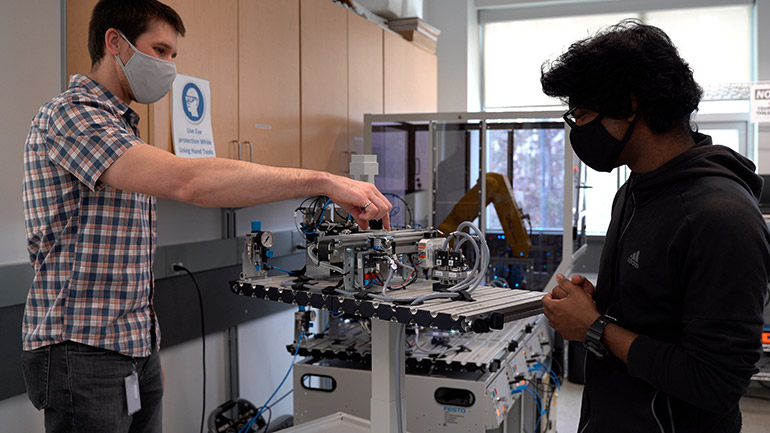
Assistant Professor of Teaching Dean Richert and student Ram Dershan prepare a workstation that will be used for the industrial automation micro-credential course.
Short-duration, competency-based options aim to help community members improve skills
With an increasing need for continued education among those looking to build their knowledge in high-demand fields, UBC Okanagan has launched two micro-credential programs as part of its career and personal education portfolio. The first of their kind at UBCO, the two new micro-credentials will focus on the fields of technical communication and industrial automation.
“Micro-credentials are short programs that are often competency-based and are designed to respond to the needs of industry,” says Ananya Mukherjee Reed, provost and vice-president academic at UBC Okanagan. “They enable UBC Okanagan to offer unique learning opportunities alongside our academic programs that reflect the evolving education needs of today’s workforce.”
The new micro-credentials are part of British Columbia’s $4 million in funding for similar initiatives across the province. UBCO’s two new programs are delivered online and learners will earn a non-credit letter of proficiency, which includes a traditional paper copy of the credential and one or more digital badges which can be shared on their professional social media profiles.
The Critical Skills for Communications in the Technical Sector course, offered through the Irving K. Barber Faculty of Science, focuses on developing skills to communicate information accurately, succinctly and unambiguously and is intended for those working or seeking employment in a technical field.
Dr. Edward Hornibrook, head of the Department of Earth, Environmental and Geographic Sciences and host of the new credential at UBCO, says the ability to communicate complex topics in a way that can be generally understood is a critical skill for employees across a breadth of industries.
“The program offers eight modules that focus on everything from improving grammar and style to better engaging with clients to producing successful technical proposals,” he says. “While many people focus on developing their technical abilities, this program is a great opportunity to improve on communication skills and will help participants get their ideas out in a clear and concise way—something that can bring a world of new opportunities for those seeking employment or wishing to advance their current position.”
Skills in Industrial Automation, offered through the School of Engineering in the Faculty of Applied Science, brings together theory with hands-on practice. Participants have the opportunity to use industry-standard tools to learn about and develop automated systems.
“Not only are these programs designed in close collaboration with industry partners to ensure they provide real value in a professional context, but also students get to hone their skills in a flexible way and network with other people in their fields with the same interests,” says Dr. Homayoun Najjaran, associate director of manufacturing engineering and creator of the industrial automation micro-credential. “This is a new and exciting offering from UBCO and one that’s going to benefit employers and individuals alike.”
While the Skills in Industrial Automation micro-credential is full, Critical Skills for Communications in the Technical Sector is open for enrolment. For more information on both programs visit: provost.ok.ubc.ca/cpe
About UBC’s Okanagan campus
UBC’s Okanagan campus is an innovative hub for research and learning founded in 2005 in partnership with local Indigenous peoples, the Syilx Okanagan Nation, in whose territory the campus resides. As part of UBC—ranked among the world’s top 20 public universities—the Okanagan campus combines a globally recognized UBC education with a tight-knit and entrepreneurial community that welcomes students and faculty from around the world in British Columbia’s stunning Okanagan Valley.
To find out more, visit: ok.ubc.ca